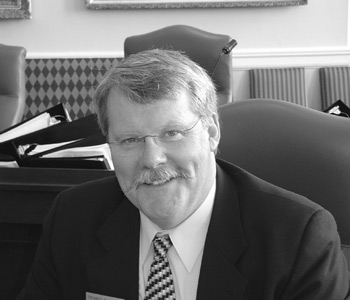Helping Fishermen … Helping Communities
by Dennis Damon

When I served as Senate Chair of the Marine Resources Committee in the Maine Legislature, I had a poster-size photograph on my office wall. It is an iconic photograph captured by world-renowned photographer, Peter Ralston.
Perhaps you have seen it. It depicts the fishing heritage of our state and the family heritage that so often accompanies that profession.
In the Senate we were not allowed to use props as we addressed our colleagues during a floor speech. I recall though, once, as I spoke to my fellow senators about the importance of protecting our coastal communities from the inevitable creeping tide of development and escalating property taxes, describing the photograph as follows:
“… there is a photograph that tells better than I can about the importance of our coastal com munities and of the families that live in them. Regrettably, I cannot show you the photo because our rules prohibit that, but I can have you see it in your own mind. It shows two people standing on the dock in one of the small fishing communities that dot our coast. I know this community. It is in my district. It is an island fishing community which in many cases makes it even more fragile and vulnera ble to escalating property taxes than mainland communities. One of the two people in the pic ture is an old fisherman. He’s dressed in yellow oil skins. His expression reveals a slight smile of satisfaction and earned pride. And his eyes, that have scanned so many distant horizons in his decades at sea, show his love and compassion. His hands are sea-swollen, strong and rough. He has one of them on the shoul der of the second person in the picture. The second person is also a fisherman. You can see that, if you know fishermen, even though he appears to be but six or seven years old, because he is holding a cod fish with both hands firmly grasping its tail. But it is not the fact that he is holding the cod that reveals he is a fisherman, it is the look on his face, the joy that his great-grandfather whose hand is on his shoulder and whose love is in his heart, gave it to him. He is proud of the cod fish. He knows what it is. He knows what it took to catch it. He is proud of his great-grandfather. He is proud of being part of a family of fishermen. Ladies and gentle men of the Senate, we cannot have the insidious creep of prop erty taxes based on the potential value of their homes, this so- called highest and best use, drive either of these fishermen, or any fishermen living on our coast, from their land, their her itage and their life!”
That floor speech was made in 2006. The old fisherman has since died. The young fisherman has grown to be a man now and, indeed, he is fishing. I bumped into him the other day. He was on his wharf getting traps ready to set out. He is tall and strong now but his face still holds that joy and optimism it did when he was a young boy.
I had come to his island aboard the Maine Seacoast Mission vessel, Sunbeam. She was referred to as “God’s Tugboat” when I first became aware of her. That was back in the ‘50s when my father was engineer on the boat that preceded this one by two vessels. He later engineered the Sunbeam that immediately preceded our current vessel.
Now, as member of the Seacoast Mission board of Directors and specifically as a member of the Island Services Committee, I, and other members of the Committee and Mission staff, have recently visited some of the islands we serve.
Since 1905 the Seacoast Mission has been providing support to the island and coastal communities of Maine. Through regular visits to the islands by the various Sunbeams, the Mission has provided pastoral, food, heat and now medical support to thousands. During this trip we were shown how our “telemedicine” equipment works. With the telemedicine hook-ups we have established on the Sunbeam that work in conjunction with shore-based equipment in various doctor’s offices and medical facilities we can, through our on-board nurse, have islanders benefit from real time conversations and consultations with doctors that would have required a day to reach and perhaps necessitated an overnight ashore. Through the advancements in technology and the efforts of the Mission islanders can now receive the medical attention they need, that many of us take for granted.
More easily available medical access allows islanders to continue to live on their islands and the Working Waterfront legislation we passed in the last six years is helping to preserve and protect the portion of the shoreline that is so important to the fishing industry. It is vital that each fishing community has a place from where its fishermen can depart and return. Fishermen must always have a place where they can load their gear and unload their catch. Throughout our history we had taken it for granted that we would always be able to do that. It wasn’t until we realized that of the 5,000-plus miles of Maine’s coastline, only 25 miles of it was available as working waterfront, so we took the action necessary to ensure that reality. The legislature must continue to assure that there is funding for the Land for Maine’s Future Program and its companion piece, Maine’s Working Waterfront Program.
It’s the understanding that our efforts link forever those who have gone before us, those present now and those yet to come. That old fisherman standing on the dock of his years with his hand resting on the shoulder of our future is much more than just a picture to me.
